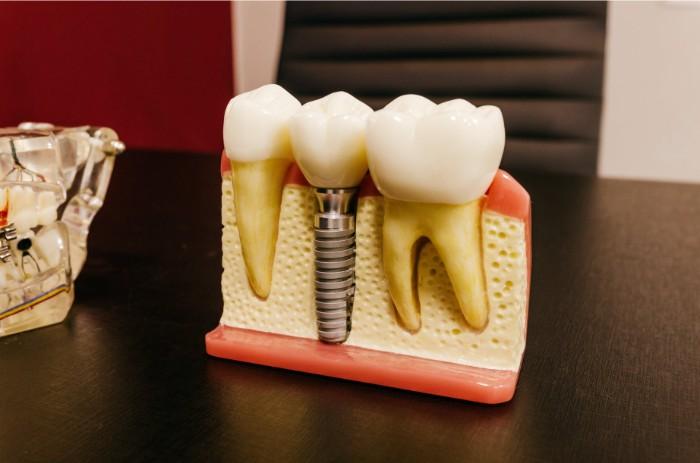
Many options exist to help you with the problem when you have tooth loss. One of which is dental implants. There having raising questions on whether Canadian insurance companies cover dental implants. “Are dental implants covered by insurance in Canada?
However, this is not a straight yes or no, as it depends on the specific insurance policy and insurer. In this article, we will look at it in detail, and you can know whether dental implants are covered by insurance in Canada and the modalities behind them.

What Are Dental Implants?
Dental implants are artificial tooth roots inserted into the jawbone to provide a stable foundation for replacement teeth. They are used as a permanent solution to replace missing teeth and restore the functionality and appearance of a natural smile.
Getting a dental implant usually involves several stages. First, a dental implant specialist or oral surgeon will evaluate your oral health, take X-rays, and create a treatment plan. The implant is then surgically placed into the jawbone, and a healing period of a few months is usually required to allow the implant to integrate with the bone.
Dental implants offer several benefits, including improved chewing and speech capabilities, enhanced aesthetics, and increased confidence. They are known for their durability and can last many years with proper oral hygiene and regular dental care.
Disclosure: My site is reader-supported. I may get commissions when you click through the affiliate links (that are great products I use and stand by) on my articles.

Dental Implants in Canada
- Dental implants are artificial tooth roots inserted into the jawbone to provide a stable foundation for replacement teeth.
- They are known for their durability and can last many years with proper oral hygiene and regular dental care.
Are Dental Implants Covered By Insurance In Canada?
In Canada, dental insurance coverage varies depending on the specific insurance plan and provider. Getting dental implants is considered a major dental procedure, and their coverage can vary. Most Canadian dental insurance plans do not fully cover the cost of dental implants, but they may provide partial coverage or reimburse a certain percentage of the cost.
It’s important to note that dental insurance plans often have limitations, waiting periods, and annual maximums for coverage. Some plans may exclude dental implants altogether or restrict coverage to certain circumstances, such as accidents or specific medical conditions. Additionally, pre-existing conditions may impact coverage eligibility.
It’s best to review the details of your specific dental insurance plan or contact your insurance provider directly to determine the extent of coverage for dental implants; They can provide accurate information regarding coverage, limitations, and any out-of-pocket costs you may incur.
What Factors Determine Whether the Insurance Company Will Cover Dental Implants?
Several factors can influence whether a dental insurance policy covers dental implants. Here are some common considerations taken into account:
Insurance Plan Coverage:
Each dental insurance plan has its coverage policies and limitations. Some plans may provide coverage for dental implants, while others may not include them or have specific criteria for coverage.
Type of Dental Insurance Plan:
Your dental insurance plan can impact coverage for dental implants. Employer-sponsored plans, individual plans, or government programs may have different coverage guidelines.
Pre-Existing Condition Clause:
Some dental insurance plans have a waiting period or exclude coverage for pre-existing conditions. If you lost the tooth before obtaining the insurance plan, coverage for the implant may be limited or excluded.
Medical Necessity:
Some insurance plans may cover dental implants if necessary. For example, if tooth loss impacts your ability to eat or speak, it may be considered medically necessary.
Alternative Treatment Options:
Insurance providers may consider alternative treatment options for tooth replacement, such as dentures or bridges. They may offer coverage for the least expensive or conventional treatment, with the cost difference from implants being the patient’s responsibility.
Coverage Limitations:
Dental insurance plans often have annual maximums, the maximum amount they will pay for dental care within a calendar year. You may be responsible for the remaining expenses if the implant cost exceeds this limit.
Does Dental Insurance Cover Children in Canada?
In Canada, dental insurance coverage for children varies depending on the specific dental insurance plan and provider. However, it’s important to note that dental coverage for children often differs from coverage for adults.
In many provinces, such as Ontario, dental coverage for children is available through government programs like the Children’s Dental Health Program (CDHP) or the Healthy Smiles Ontario (HSO) program. 
These programs aim to provide dental care coverage for eligible children from low-income families. The coverage under these programs usually includes preventive and basic dental services, such as regular check-ups, cleanings, fillings, and extractions.
For families with private dental insurance plans, coverage for children may vary. Some plans include coverage for children’s dental care as part of the overall family coverage, while others may have specific child-focused dental insurance plans.
These plans often cover a range of dental services, including preventive care, restorative treatments, and orthodontics.
Note that government programs for dental coverage may have specific eligibility criteria, so it’s advisable to check with your provincial health authority or dental association to determine if your child qualifies for any public programs.

Dental Implants in Canada
- Dental implants are artificial tooth roots inserted into the jawbone to provide a stable foundation for replacement teeth.
- They are known for their durability and can last many years with proper oral hygiene and regular dental care.
Are There Alternatives To Dental Implants?
Yes, there are several alternatives to dental implants for replacing missing teeth. The most common alternatives include:
Dentures:
Dentures are removable items that can replace a lost tooth and surrounding tissue. They come in two types: complete dentures, which replace all teeth in the upper or lower jaw, and partial dentures, which replace a few missing teeth. Dentures can be a cost-effective solution and can be customized to fit your mouth. However, they may be less stable than dental implants and require regular maintenance.
Dental Bridges:
Dental bridges are fixed restorations that replace one or more missing teeth. They consist of artificial teeth (pontics) held in place by dental crowns attached to the adjacent natural teeth.
Bridges can be a good option when healthy teeth are on either side of the gap. They are fixed in place, which provides stability but may require the alteration of the adjacent teeth.
Resin-Bonded Bridges:
Also known as Maryland bridges, resin-bonded bridges are a conservative alternative to traditional bridges. They use metal or porcelain wings bonded to the back of adjacent teeth for support, eliminating the need for extensive tooth preparation. Resin-bonded bridges mostly replace front teeth and offer a less invasive and reversible option.
Removable Partial Dentures:
Removable partial dentures are similar to complete dentures but are used when some natural teeth remain. They consist of artificial teeth attached to a gum-colored plastic base, with precision attachments or metal clasps that hold the denture in place. You can easily remove removable partial dentures to be taken out for cleaning.
Flipper Dentures:
Flipper dentures are temporary removable partial dentures often used during the healing phase after tooth extraction. They are lightweight and have a gum-colored acrylic base with one or more artificial teeth. Flipper dentures provide temporary replacement until a permanent solution, such as a bridge or implant, can be placed.
It’s essential to consult a dentist to determine the most suitable alternative for your dental needs. They can evaluate your oral health, discuss the pros and cons of each option, and help you make an informed decision based on your preferences, budget, and long-term dental goals.
How Much Does It Cost To Get Full Dental Implants in Canada?
The cost of full dental implants in Canada varies depending on several factors, including the location, complexity of the case, the number of implants required, the type of materials used, and the specific dental clinic or specialist performing the procedure. Generally, full dental implants in Canada range from $3,000 to $6,000 per implant, not including additional costs for related procedures, such as bone grafting or tooth extractions.
Keep in mind that the cost of dental implants typically includes multiple components, such as the implant itself, the abutment (connector), and the dental crown that is placed on top to replace the missing tooth. These components contribute to the overall cost of the treatment.
It’s essential to consult with a dental professional or oral surgeon for an accurate assessment of your specific case and a detailed cost estimate. They can evaluate your oral health, discuss treatment options, and provide a personalized quote based on your needs.
Does Insurance Cover Dental in Canada?
In Canada, dental insurance is separate from the government-funded healthcare system. While provincial healthcare plans cover basic medical care, dental coverage is typically not included.
Dental insurance coverage in Canada is usually provided through private insurance plans. You can obtain it individually or through employer-sponsored group plans. The coverage and benefits provided by dental insurance plans can vary widely depending on the specific plan and provider.
Canada’s Dental insurance plans often cover some of the costs of routine dental care, such as check-ups, cleanings, and X-rays. They may also provide partial coverage for restorative procedures like fillings, root canals, and extractions. However, coverage for more extensive procedures like dental implants, orthodontics, or cosmetic dentistry is typically limited or not included.
Is It Worth To Buy Dental Insurance In Canada?
Deciding whether dental insurance is worth it in Canada depends on your circumstances, oral health needs, and financial considerations. Below are some factors to determine if buying dental insurance is worth it.
Oral Health Needs:
Assess your oral health condition and the likelihood of requiring dental treatments. If you have ongoing dental issues or anticipate the need for extensive treatments like crowns, bridges, or orthodontics, having dental insurance can help offset some of the costs.
Preventive Care:
Dental insurance often covers preventive services like check-ups, cleanings, and X-rays. If you prioritize regular preventative care to maintain good oral health, having dental insurance can encourage you to seek routine dental visits without incurring significant out-of-pocket expenses.
Cost of Dental Procedures:
Consider the potential costs of dental treatments without insurance. Some procedures, such as dental implants or orthodontics, can be expensive. Dental insurance can provide some financial relief by covering a portion of these costs.
Budget and Affordability:
Evaluate your budget and financial resources. Dental insurance plans typically involve monthly premiums, deductibles, and co-payments. Compare these costs to the potential savings you might achieve by having insurance coverage. Determine if the premium costs are reasonable and align with your budget.
Employer Coverage:
If you have access to an employer-sponsored dental insurance plan, it may be more cost-effective than individual plans. Employer plans often negotiate lower rates and provide broader coverage, making them potentially more valuable.
Consideration of Alternative Options:
Evaluate whether self-funding dental expenses or exploring alternative payment options, such as dental savings or discount plans, might be more cost-effective for your situation.

Dental Implants in Canada
- Dental implants are artificial tooth roots inserted into the jawbone to provide a stable foundation for replacement teeth.
- They are known for their durability and can last many years with proper oral hygiene and regular dental care.
People Also Ask:
Who Is Eligible For Canadian Dental Benefits?
Children under 12 years of age, who do not have access to private dental insurance, and those from home whose family income is less than $90,000 a year are eligible for the Canada dental benefit. The Canada Dental Benefit (CDB) provides tax-free, direct, up-front payments to help cover dental care.
Who is Eligible For Free Dental Care in Canada?
The free Dental Care Canada is for Canadians with annual family income below $90,000, with no co-pays for those with less than $70,000 as family income.
By the end of 2023, the Canadian Dental Care Plan will be available to seniors, uninsured Canadians under 18, and persons with disabilities. Uninsured Canadians with family incomes below $90,000 will have their dental health adequately managed.
How Much Do All On 4 Dental Implants Cost In Canada?
Averagely, all-on-4 teeth dental implants in Canada cost about $20.000 to $25.000. However, this might seem expensive, and it is because dental implants require sophisticated evaluation tools.
How Long Do Dental Implants Last?
Dental implants can last a lifetime with regular brushing, flossing, and dental check-ups every six months. The implant’s crown lasts 10 to 15 years before it must be replaced due to wear and tear.
Conclusion
Insurance in Canada can cover dental implants, but it usually depends on the policy and insurer. However, due to the expensive nature of the implant installation, most insurance companies offer partial or total coverage in case of certain events.
It’s best to review the details of your specific dental insurance plan or contact your insurance provider directly to determine the extent of coverage for dental implants,








